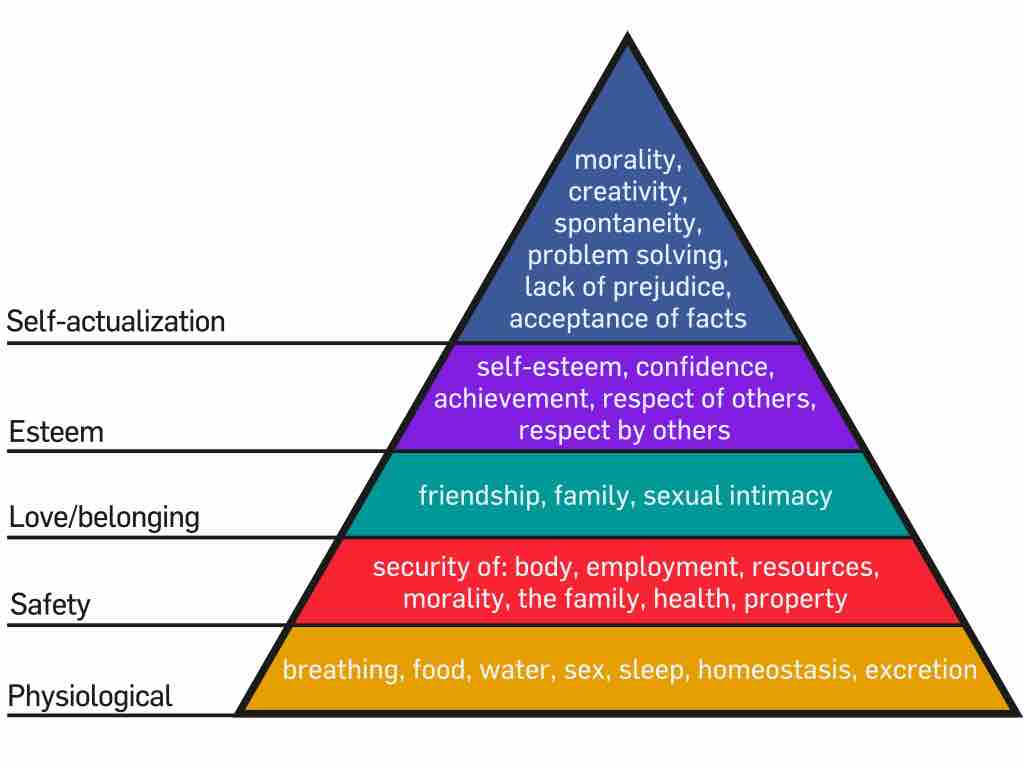The most fundamental and basic needs are what Maslow called "deficiency needs" or "d-needs":
- Esteem
- Friendship and love
- Security
- Physical needs
If these "deficiency needs" are not met, the body gives no physical indication but the individual feels anxious and tense. Maslow's theory suggests that the most basic level of needs must be met before the individual will focus on higher level needs.

Maslow's Hierarchy of Needs
Maslow's hierarchy captures the varying degree of needs by which humans are motivated. According to the psychological perspective, decision makers are motivated by these needs and decisions are influenced accordingly.
The human mind is complex, so many different motivations from different levels of Maslow's pyramid usually occur at the same time. Maslow was clear about speaking of these levels and their satisfaction in terms such as "relative" and "general" and "primarily. " Maslow acknowledged that many different levels of motivation are likely to be going on in a human all at once. His focus in discussing the hierarchy was to identify the basic types of motivations and the order that they generally progress as lower needs are reasonably well met.
Physiological Needs
Physiological needs are generally obvious because they are requiremed for survival. If requirements are not met, the body cannot continue to function. People lacking food, love, esteem, or safety would consider food to be their greatest need. Air, water, food, clothing, and shelter are the basic physiological needs.
Safety Needs
Once physical needs are satisfied, individual safety takes precedence. Safety and Security needs include:
- Personal security
- Financial security
- Health and well-being
- Safety net against accidents/illness and their adverse impacts
- Love and belonging
Interpersonal Needs
After physiological and safety needs are fulfilled, the third layer of human needs are interpersonal. This involves feelings of belongingness. Deficiencies in interpersonal needs, due to neglect, shunning, ostracism, etc., can impact an individual's ability to form and maintain emotionally significant relationships in general, such as:
- Friendship
- Intimacy
- Family
Humans need to feel a sense of belonging and acceptance, whether it comes from a large social group, such as clubs, religious groups, professional organizations, gangs, family, or mentors. Humans need to love and be loved (sexually and non-sexually) by others. Without these connections, many people become susceptible to loneliness, social anxiety, and clinical depression. This need for belonging can sometimes overcome physiological and security needs. For example, an anorexic may ignore the need to eat and the security of health for a feeling of control and belonging.
Esteem
Esteem represents the normal human desire to be accepted and valued by others. People need to engage themselves to gain recognition and have an activity or activities that give the person a sense of contribution, to feel self-valued, be it in a profession or hobby. Imbalances at this level can result in low self-esteem or an inferiority complex. Many people with low self-esteem will not be able to improve their view of themselves simply by receiving fame, respect, and glory externally, but must first accept themselves internally. Psychological imbalances, such as depression, can prevent one from obtaining self-esteem on both levels.
Maslow noted two versions of esteem needs: a "lower" version and a "higher" version. The "lower" version of esteem is the need for respect from others. This may include a need for status, recognition, fame, prestige, and attention. The "higher" version manifests itself as the need for self-respect. For example, the person may have a need for strength, competence, mastery, self-confidence , independence, and freedom. This "higher" version takes precedence over the "lower" version because it relies on an inner competence established through experience. Deprivation of these needs may lead to an inferiority complex, weakness, and helplessness.
Maslow also states that even though these are examples of how the quest for knowledge is separate from basic needs, he warns that these "two hierarchies are interrelated rather than sharply separated. " This means that this level of need, as well as the next and highest level, are not strict, separate levels but closely related to others, and this is possibly the reason that these two levels of need are left out of most textbooks.
Self-actualization
"What a man can be, he must be. " This quotation forms the basis of the perceived need for self-actualization. This level of need refers to what a person's full potential is and the realization of that potential. Maslow describes this level as the desire to accomplish everything that one can, to become the most that one can be. Individuals may perceive or focus on this need very specifically. For example, one individual may have the strong desire to become an ideal parent. In another, the desire may be expressed athletically. For others, it may be expressed in paintings, pictures, or inventions. As previously mentioned, Maslow believed that to understand this level of need, the person must not only achieve the previous needs, but master them.